- Home
- Pat Barker
Toby's Room
Toby's Room Read online
PAT BARKER
Toby’s Room
HAMISH HAMILTON
an imprint of
PENGUIN BOOKS
Contents
By the same author
PART ONE: 1912
Chapter One
Chapter Two
Chapter Three
Chapter Four
Chapter Five
Chapter Six
Chapter Seven
Chapter Eight
PART TWO: 1917
Chapter Nine
Chapter Ten
Chapter Eleven
Chapter Twelve
Chapter Thirteen
Chapter Fourteen
Chapter Fifteen
Chapter Sixteen
Chapter Seventeen
Chapter Eighteen
Chapter Nineteen
Chapter Twenty
Chapter Twenty-one
Chapter Twenty-two
Chapter Twenty-three
Chapter Twenty-four
Chapter Twenty-five
Chapter Twenty-six
Chapter Twenty-seven
Chapter Twenty-eight
Author’s Note
By the same author
Union Street
Blow Your House Down
Liza’s England (formerly The Century’s Daughter)
The Man Who Wasn’t There
Regeneration
The Eye in the Door
The Ghost Road
(The Regeneration Trilogy)
Another World
Border Crossing
Double Vision
Life Class
For David, always
PART ONE: 1912
One
Elinor arrived home at four o’clock on Friday and went straight to her room. She hung the red dress on the wardrobe door, glancing at it from time to time as she brushed her hair. That neckline seemed to be getting lower by the minute. In the end her nerve failed her. She hunted out her pink dress, the one she used to wear for dancing classes at school, put it on and stood in front of the cheval mirror. She turned her head from side to side, her hands smoothing down the creases that had gathered round the waist. Oh dear. No, no, she couldn’t do it, not this time, not ever again. She wriggled out of it and threw it to the back of the wardrobe. Out of the window would have been more satisfying, but her father and brother-in-law were sitting on the terrace. She pulled the red dress over her head, tugged the neckline up as far as it would go, and went reluctantly downstairs.
Father met her in the hall and hugged her as if he hadn’t seen her for a year. Outside the living room, she hesitated, but there was no point wearing a red dress and then creeping along the skirting boards like a mouse, so she flung the door open and swept in. She kissed Rachel, waved at Rachel’s husband, Tim, who was at the far side of the room talking to her mother, and then looked around for Toby, but he wasn’t there. Perhaps he wasn’t coming after all, though he’d said he would. The prospect of his absence darkened the whole evening; she wasn’t sure she could face it on her own. But then, a few minutes later, he came in, apologizing profusely, damp hair sticking to his forehead. He must’ve been for a swim. She wished she’d known; she’d have gone with him. Not much hope of talking to him now; Mother had already beckoned him to her side.
Rachel was asking Elinor question after question about her life in London, who she met, who she went out with, did she have any particular friends? Elinor said as little as possible, looking for an excuse to get away. It was supplied by her mother, who appeared at her side and hissed, ‘Elinor, go upstairs at once and take that ridiculous dress off.’
At that moment the gong sounded. Elinor spread her hands, all injured innocence, though underneath she felt hurt and humiliated. Yet again, she was being treated like a child.
Father came in at the last minute just as they were sitting down. She wondered at the curious mixture of poking and prying and secrecy that ruled their lives. Mother and Father saw very little of each other. She needed country air for the sake of her health; he lived at his club because it was such a convenient walking distance from the hospital, where he often had to be available late at night. Was that the reason for their week-long separation? She doubted it. Once, crossing Tottenham Court Road, she’d seen her father with a young woman, younger even than Rachel. They’d just come out of a restaurant. The girl had stood, holding her wrap tightly round her thin shoulders, while Father flagged down a cab and helped her into it, and then they were whirled away into the stream of traffic. Elinor had stood and watched, open-mouthed. Father hadn’t seen her; she was sure of that. She’d never mentioned that incident to anyone, not even to Toby, though she and Toby were the only members of the family who kept no secrets from each other.
She sat in virtual silence for the first half of the meal – sulking, her mother would have said – though Tim did his clumsy best to tease her out of it. Did she have a young man yet? Was all this moodiness because she was in love?
‘There’s no time for anything like that,’ Elinor said, crisply. ‘They work us too hard.’
‘Well, you know what they say, don’t you? All work and no play …?’ He turned to Toby. ‘Have you seen her with anybody?’
‘Not yet, but I’m sure it’s only a matter of time.’
Toby’s joining in the teasing, however reluctantly, was all it took to chafe Elinor’s irritation into fury.
‘Well, if you must know I have met somebody.’ She plucked a name from the air. ‘Kit Neville.’
This was not true: she’d hardly spoken to Kit Neville. He was merely the loudest, the most self-confident, the most opinionated and, in many ways, the most obnoxious male student in her year, and therefore the person she thought of first.
‘What does he do?’ Mother asked. Predictably.
‘He’s a student.’
‘What sort of student?’
‘Art. What else would he be doing at the Slade?’
‘Have you met his family?’
‘Now why on earth would I want to do that?’
‘Because that’s what people do when –’
‘When they’re about to get engaged? Well, I’m not. We’re just friends. Very good friends, but … friends.’
‘You need to be careful, Elinor,’ Rachel said. ‘Living in London on your own. You don’t want to get a reputation …’
‘I do want to get a reputation, as it happens. I want to get a reputation as a painter.’
‘You know what I mean.’
‘Oh, for heaven’s sake.’
‘Elinor,’ her father said. ‘That’s enough.’
So even Father was turning against her. The last mouthful of cheese and biscuit sticking in her dry throat, Elinor followed her mother and Rachel out of the dining room. They sat over a pot of coffee that nobody wanted, staring at their reflections in the black windows that overlooked the airless terrace. The windows couldn’t be opened because of moths. Rachel had a horror of moths.
‘So who is this Mr Neville?’ Mother asked.
‘Nobody, he’s in my year, that’s all.’
‘I thought you said classes weren’t mixed?’
‘Some are, some aren’t.’ She could barely speak for exasperation; she’d brought this on herself. ‘Look, it’s not as if we’re going out …’
‘So why mention him?’ Rachel’s voice was slurry with tiredness. Tendrils of damp hair stuck to her forehead; she’d eaten scarcely anything. She yawned and stretched her ankles out in front of her. ‘Look at them. Puddings.’ She dug her fingers into the swollen flesh as if she hated it.
‘You must be worn out in this heat,’ Mother said. ‘Why don’t you put your feet up?’
Feet up in the drawing room? Unheard of. But then Elinor intercepted a glance be
tween the two women, and understood. She wondered when she was going to be told. What a family they were for not speaking. She wanted to jump on the table and shout out every miserable little secret they possessed, though, apart from the breakdown of her parents’ marriage, she couldn’t have said what the secrets were. But there was something: a shadow underneath the water. Swim too close and you’d cut your feet. A childhood memory surfaced. On holiday somewhere, she’d cut her foot on a submerged rock; she’d felt no pain, only the shock of seeing her blood smoking into the water. Toby had taken off his shirt and wrapped it round her foot, then helped her back to the promenade. She remembered his pink fingers, wrinkled from the sea, the whorl of hair on the top of his head as he bent down to examine the cut.
Why couldn’t they leave her alone? All this nonsense about young men … It was just another way of drilling it into you that the real business of a girl’s life was to find a husband. Painting was, at best, an accomplishment; at worst, a waste of time. She was trying to hold on to her anger, but she’d suppressed it so long it was threatening to dissipate into depression. As it so often did. Why hadn’t Toby spoken up for her? Instead of just sitting there, fiddling with his knife and fork.
She was thoroughly fed up. As soon as possible after the men joined them, she excused herself, saying she needed an early night.
As she closed the door behind her, she heard Father ask, ‘What’s the matter with her?’
‘Oh, you know,’ Mother said. ‘Girls.’
Meaning? Nothing that made her feel better about herself, or them.
Next morning after breakfast Toby announced that he was going to walk to the old mill.
‘In this heat?’ Mother said.
‘It’s not too bad. Anyway, it’ll be cooler by the river.’
Elinor followed him into the hall. ‘Do you mind if I come?’
‘It’s a long way.’
‘Toby, I walk all over London.’
‘Don’t let Rachel hear you say that. Rep-u-tation!’
They arranged to meet on the terrace. Soon Elinor was following her brother across the meadow, feeling the silken caress of long grasses against her bare arms and the occasional cool shock of cuckoo spit.
‘You know this chap you were talking about last night …?’
‘Oh, don’t you start.’
‘I was only asking.’
‘I only mentioned him because I’m sick of being teased. I just wanted to get Tim off my back. Instead of which, I got Mother on to it.’
‘And Rachel.’
‘She’s worse than Mother.’
‘She’s jealous, that’s all. She settled down a bit too early and … Well, she didn’t exactly get a bargain, did she?’
‘You don’t like Tim, do you?’
‘He’s harmless. I just don’t think she’s very happy.’ He turned to face her. ‘You won’t make that mistake, will you?’
‘Marrying Tim? Shouldn’t think so.’
‘No-o. Settling down too early.’
‘I don’t intend to “settle down” at all.’
She hoped that was the end of the subject, but a minute later Toby said, ‘All the same, there has to be a reason you mentioned him – I mean, him, rather than somebody else.’
‘He’s perfectly obnoxious, that’s why. He was just the first person who came to mind.’
Once they reached the river path, there was some shade at last, though the flashing of sunlight through the leaves and branches was oddly disorientating, and more than once she tripped over a root or jarred herself stepping on air.
‘Be easier coming back,’ Toby said. ‘We won’t have the sun in our eyes.’
She didn’t want to go on talking. She was content to let images rise and fall in her mind: her lodgings in London, the Antiques Room at the Slade, the friends she was starting to make, the first few spindly shoots of independence, though it all seemed a little unreal here, in this thick heat, with dusty leaves grazing the side of her face and swarms of insects making a constant humming in the green shade.
She was walking along, hardly aware of her surroundings, when a sudden fierce buzzing broke into her trance. Toby caught her arm. Bluebottles, gleaming sapphire and emerald, were glued to a heap of droppings in the centre of the path. A few stragglers zoomed drunkenly towards her, fastening on her eyes and lips. She spat, batting them away.
‘Here, this way,’ Toby said. He was holding a branch for her so she could edge past the seething mass.
‘Fox?’ she asked, meaning the droppings.
‘Badger, I think. There’s a sett up there.’
She peered through the trees, but couldn’t see it.
‘Do you remember we had a den here once?’ he said.
She remembered the den: a small, dark, smelly place under some rhododendron bushes. Tiny black insects crawled over your skin and fell into your hair. ‘I don’t think it was here.’
‘It was. You could just hear the weir.’
She listened, and sure enough, between the trees, barely audible, came the sound of rushing water.
‘You’re right, I remember now. I thought it was a bit further on.’
She thought he might want to go there, he lingered so long, but then he turned and walked on.
The river was flowing faster now, picking up leaves and twigs and tiny, struggling insects and whirling them away, and the trees were beginning to thin out. More and more light reached the path until, at last, they came out into an open field that sloped gently down towards the weir. A disused mill – the target of their walk – stood at the water’s edge, though it was many years since its wheel had turned.
This had been the forbidden place of their childhood. They were not to go in there, Mother would say. The floorboards were rotten, the ceilings liable to collapse at any minute …
‘And don’t go near the water,’ she’d call after them, in a last desperate attempt to keep them safe, as they walked away from her down the drive. ‘We won’t,’ they’d chorus. ‘Promise,’ Toby would add, for good measure, and then they would glance sideways at each other, red-faced from trying not to giggle.
Now, Elinor thought, they probably wouldn’t bother going in, but Toby went straight to the side window, prised the boards apart and hoisted himself over the sill. After a second’s hesitation Elinor followed.
Blindness, after the blaze of sunlight. Then, gradually, things became clear: old beams, cobwebs, tracks of children’s footprints on the dusty floor. Their own footprints? No, of course not, couldn’t be, not after all these years. Other children came here now. She put her foot next to one of the prints, marvelling at the difference in size. Toby, meanwhile, was expressing amazement at having to duck to avoid the beams.
Because this place had been the scene of so many forbidden adventures, an air of excitement still clung to it, in spite of the dingy surroundings. She went across to the window and peered out through a hole in the wall. ‘I wonder what it was like to work here.’
Toby came across and stood beside her. ‘Pretty good hell, I should think. Noise and dust.’
He was right of course; when the wheel turned the whole place must have shook. She turned to him. ‘What do you think –?’
He grabbed her arms and pulled her towards him. Crushed against his chest, hardly able to breathe, she laughed and struggled, taking this for the start of some childish game, but then his lips fastened on to hers with a groping hunger that shocked her into stillness. His tongue thrust between her lips, a strong, muscular presence. She felt his chin rough against her cheek, the breadth of his chest and shoulders, not that round, androgynous, childish softness that had sometimes made them seem like two halves of a single person. She started to struggle again, really struggle, but his hand came up and cupped her breast and she felt herself softening, flowing towards him, as if something hard and impacted in the pit of her stomach had begun to melt.
And then, abruptly, he pushed her away.
‘I’m sorry. I’m sorry. Sorry, s
orry …’
She couldn’t speak. How was it possible that anybody, in a single moment, could stumble into a chasm so deep there was no getting out of it?
‘Look, you go back,’ he said. ‘I’ll come home later.’
Automatically, she turned to go, but then remembered the river and turned back.
‘No, go on, I’ll be all right,’ he said.
‘They’ll wonder what’s happened if I show up on my own.’
‘Say you felt ill.’
‘And you went on and left me? Don’t think so. No, come on, we’ve got to go back together.’
He nodded, surrendering the decision to her, and that shocked her almost more than the kiss. He was two years older, and a boy. He had always led.
All the way home, treading in his footsteps, aware, as she’d never been before, of the movement of muscles in his back and legs, she was trying to tame the incident. Incident. But it wasn’t an incident, it was a catastrophe that had ripped a hole in the middle of her life. But then the flash of honesty passed, and she began again to contain, to minimize, to smooth over, to explain. A brotherly hug, nothing to make a fuss about, a kiss that had somehow gone a tiny bit wrong. That was all. Best forgotten. And as for her reaction: shock, fear, and something else, something she hadn’t got a name for; that was best forgotten too.

 Border Crossing
Border Crossing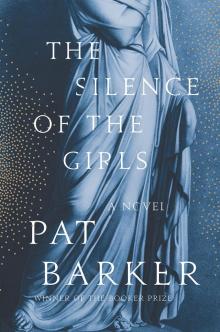 The Silence of the Girls
The Silence of the Girls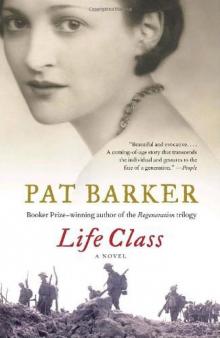 Life Class
Life Class Regeneration
Regeneration Another World
Another World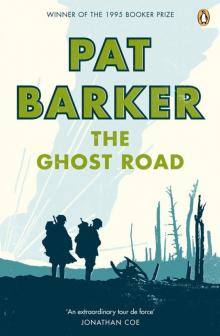 The Ghost Road
The Ghost Road Double Vision
Double Vision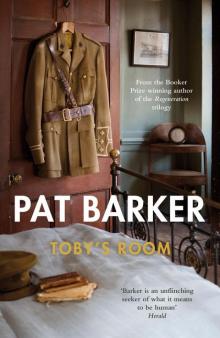 Toby's Room
Toby's Room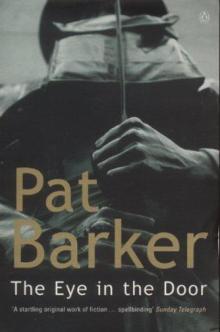 Regeneration Trilogy 02 - The Eye in the Door
Regeneration Trilogy 02 - The Eye in the Door The Eye in the Door
The Eye in the Door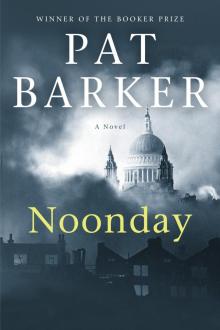 Noonday
Noonday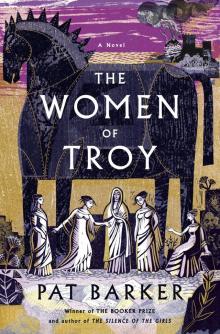 The Women of Troy: A Novel
The Women of Troy: A Novel